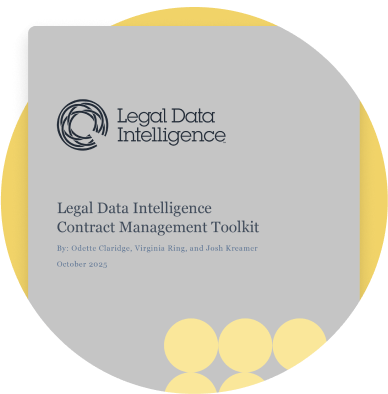Toolkit: The LDI Approach to Strategic Contract Management
Author: LDI Team
Imagine a multinational corporation implementing a centralized contract management system that stores all agreements in a secure repository, provides automated alerts for key dates, and maintains an audit trail for accountability. Standardized workflows, templates, and clause libraries streamline contract review and execution, while advanced search and reporting tools make it easy to locate terms and track obligations. Such a system reduces legal risk, prevents revenue leakage, and cuts costs by avoiding missed renewals, minimizing errors, and decreasing reliance on outside counsel. By giving legal, procurement, finance, and sales a single source of truth, it fosters seamless collaboration and ensures that stakeholders always work with the correct version.
This picture-perfect scenario may sound like a pipe dream. A new toolkit launched by Legal Data Intelligence takes a deep dive into what it takes to turn this idealistic aspiration into an achievable (and ultimately inevitable) outcome.
Created by the Corporate LDI Architects team, the Legal Data Intelligence Contract Management Toolkit serves as a practical and comprehensive guide for elevating contract management from a routine administrative function to a strategic business capability.
Indeed, legal departments today are swimming in pools of contract data carrying information that could provide strategic insights, streamline costs, drive unrealized revenue potential, and create a competitive advantage for any business. This LDI toolkit is a must-read for any legal professional who regularly works with contracts. Think of it as a starter kit that helps you cut through the clutter, reduces cognitive load, and ultimately take control of your contract data.
Value Propositions and Talking Points to Guide Stakeholder Discussions
The toolkit features a comprehensive list of roles—from the general counsel in legal to the category manager in procurement and the controller in finance—to help practitioners map all relevant stakeholders involved in implementing a new contract management process.
It captures a wide range of value propositions and talking points to help readers facilitate effective and well-organized discussions about adopting a contract management system. For example, the guide outlines how Contract Lifecycle Management (CLM) can help maintain version control and detailed records of edits, approvals, and signatures—an important consideration for risk and compliance teams managing regulatory and internal audits.

Legal Data Intelligence Contract Management Toolkit
Get the ToolkitTurning a Siloed, Linear Operation to an Interconnected, Circular Process
The guide examines the contract management lifecycle as part of a larger circular process in which data and understanding flow through different stages of the lifecycle helping legal and business teams optimize contract performance and mitigate risk every step of the way. In this process, each stage continuously informs and enhances the other.
For example, by systematically categorizing past contracts and capturing critical metadata, teams gain valuable insight into contract types, obligations, and historical trends. These insights, in turn, inform and benefit subsequent stages in the lifecycle such as contract drafting, negotiation, and execution.
Applying the Right Technology to the Right Use Case
Many contract tools today are purpose-built to solve specific challenges. Organizations may therefore need to select multiple types of tools to address different use cases. The toolkit breaks these into three categories: Contract Lifecycle Management platforms, extraction and analysis tools, and hybrid tools that combine both functions.
It offers a clear overview of each category’s capabilities and provides examples of how they are typically used, along with the roles and teams that rely on them. Readers will gain insight into how to align their technology requirements with their organization’s workflow complexity, contract volume, and integration needs.
Evaluating the Tool
The toolkit outlines key considerations for evaluating contract management tools, including contract volume and complexity, stakeholder requirements, integration demands, and security expectations. It underscores the importance of assessing usability, scalability, and total cost of ownership, as well as the benefits of demos, trials, and vendor due diligence.
By working through these considerations, readers can identify the right mix of tools to support drafting, negotiation, analysis, storage, and broader lifecycle management with greater efficiency and precision.
This toolkit was jointly created by LDI Architects Odette Claridge (Engagement Manager, ProSearch), Virginia Ring (Principal, Kilpatrick Townsend & Stockton LLP), Tim Kurucz (Director of Legal Services, AstraZeneca), Tara Lawler (Partner, Morgan Lewis), Jenya Moshkovich (Assistant General Counsel, Global eDiscovery Counsel, Genentech), Jack Thompson (Senior Manager, Legal Technology, Freddie Mac), Nicholas Wittenburg (Corporate Counsel and Senior Advisor for Legal Technology and Innovation, Armedia), along with LDI founding member Josh Kreamer (Founder and CEO, Seedless).
Get the full toolkit here.